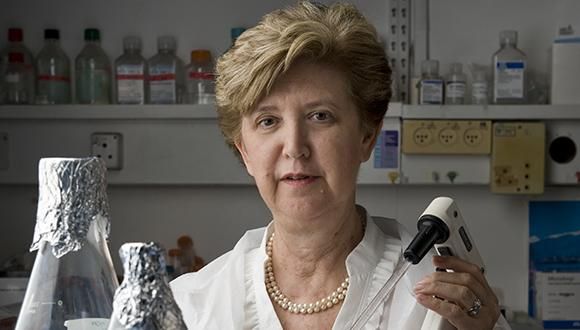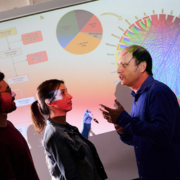Prof. Illana Gozes ranked among top researchers in the world in her field
This ranking places TAU first in Israel and among leading institutions in the world in the field of tauopathy - one of the major pathologies of Alzheimer's disease
Prof. Illana Gozes, of the Sackler Faculty of Medicine and Sagol School of Neuroscience at Tel Aviv University, was ranked as one of the world’s leading experts in the field of tauopathy (one of the leading pathologies in Alzheimer's disease) and a world-class expert in drugs that protect the brain. The ranking comes from the international website Expertscape, based on 359 articles published since 2009.
"Tauopathy is a pathology characterized by deposition of the protein Tau in a person’s brain (neurofibrillary tangles). Tauopathy is found in neurodegenerative diseases, the most common being Alzheimer's disease. Other known diseases that may exhibit tauopathy include, for example, frontotemporal dementia, Parkinson's disease and amyotrophic lateral sclerosis (ALS)” Prof. Gozes explains.
Professor Gozes, of the Department of Human Molecular Genetics and Biochemistry of the Sackler Faculty of Medicine, is considered a pioneer in the field of molecular brain research and translational medicine. She discovered the ADNP gene that was later found to cause the ADNP syndrome within the autism spectrum disorders. Professor Gozes further linked ADNP to Alzheimer's disease and schizophrenia. ADNP was shown to be essential for brain formation, activating hundreds of genes, and protecting connections in the brain (synapses). Prof. Gozes is now focusing on developing medicine based on ADNP using innovative genome edited models.
The relationship between Alzheimer's and autism
Recently, a group of researchers led by Prof. Gozes has found a high overlap between mutations that can be found in children with autism and intellectual disabilities, and mutations in the brains of Alzheimer's patients. The researchers then focused specifically on mutations in the ADNP gene, which has an important role in brain development and in protecting the structure of neurons in the brain. They found that treatment with a shortened segment of the ADNP protein, called NAP or CP201, may protect brain cells from the effects of mutations, and help Alzheimer's and autistic patients.
"The ADNP protein, produced by the ADNP gene, was discovered in my lab about 20 years ago, and we have been studying it ever since," says Professor Gozes. "Over the years, we found that ADNP plays a major role in brain development in the fetus, and that its action is linked to the Tau protein, which binds to the nerve cell skeleton and stabilizes the cell structure. Tau is known to be damaged in Alzheimer's patients. In the current study, we found several new mutations in the ADNP gene in the brain of Alzheimer's patients. We also found that as the frequency of ADNP mutations in the patient brain increases, the pathology of the protein Tau also rises."
"Our research opens a new horizon for the study and treatment of Alzheimer's disease and autism," says Professor Gozes. "To date, Alzheimer's researchers have focused primarily on the amyloid and Tau deposits that form in the brain of Alzheimer's patients. Our study is turning the attention in another direction - mutations in regulatory proteins that affect Tau, thus damaging the structure of the neurons in the brain.”
"In the past, we extracted from ADNP a short segment called CP201. We now show that CP201 is protective against ADNP mutations affecting Tau activity." CP201 is being developed for the ADNP syndrome. Coronis Neurosciences, an Israeli company, holds the license to develop CP201 from Ramot, the technology transfer company of Tel Aviv University.






